La Marseillaise is the French national anthem and it has a long history that speaks to the history of France itself. In both French and English, the song is a powerful and patriotic anthem that is known throughout the world.
If you are studying the French language, learning the words to La Marseillaise is definitely recommended. In this lesson, you will see a side-by-side translation from French to English that will help you understand its meaning and why it is so important to the people of France.
The Lyrics for La Marseillaise (L'Hymne national français)
La Marseillaise was composed by Claude-Joseph Rouget de Lisle in 1792 and was first declared the French national anthem in 1795. There is much more to the song's story, which you can find below. First, however, let's learn how to sing La Marseillaise and understand the English translation of the lyrics.
- Rouget de Lisle originally wrote the first six verses. The seventh was added sometime later in 1792, according to the French government, though no one knows whom to credit for the last verse.
- It is typical that the refrain is repeated after each stanza.
- At public French performances today, including sporting events, you will often find that only the first verse and the refrain are sung.
- On occasion, the first, sixth, and seventh verses are sung. Again, the refrain is repeated between each.
| French | English Translation by Laura K. Lawless |
|---|---|
Verse 1:
Allons enfants de la patrie,
Le jour de gloire est arrivé ! Contre nous de la tyrannie L'étendard sanglant est levé ! (bis) Entendez-vous dans les campagnes, Mugir ces féroces soldats ? Ils viennent jusque dans nos bras Égorger nos fils, nos compagnes ! |
Verse 1:
Let's go children of the fatherland,
The day of glory has arrived!Against us tyranny's Bloody flag is raised! (repeat) In the countryside, do you hear The roaring of these fierce soldiers? They come right to our arms To slit the throats of our sons, our friends! |
Refrain:
Aux armes, citoyens !
Formez vos bataillons ! Marchons ! Marchons ! Qu'un sang impur Abreuve nos sillons ! |
Refrain:
Grab your weapons, citizens!
Form your battalions! Let us march! Let us march! May impure blood Water our fields! |
Verse 2:
Que veut cette horde d'esclaves,De traîtres, de rois conjurés ? Pour qui ces ignobles entraves, Ces fers dès longtemps préparés ? (bis) Français ! pour nous, ah ! quel outrage ! Quels transports il doit exciter ! C'est nous qu'on ose méditer De rendre à l'antique esclavage ! |
Verse 2:
This horde of slaves, traitors, plotting kings,What do they want? For whom these vile shackles, These long-prepared irons? (repeat) Frenchmen, for us, oh! what an insult! What emotions that must excite! It is us that they dare to consider Returning to ancient slavery! |
Verse 3:
Quoi ! ces cohortes étrangèresFeraient la loi dans nos foyers ! Quoi ! ces phalanges mercenaires Terrasseraient nos fiers guerriers ! (bis) Grand Dieu ! par des mains enchaînées Nos fronts sous le joug se ploiraient ! De vils despotes deviendraient Les maîtres de nos destinées ! |
Verse 3:
What! These foreign troopsWould make laws in our home! What! These mercenary phalanxes Would bring down our proud warriors! (repeat) Good Lord! By chained hands Our brows would bend beneath the yoke! Vile despots would become The masters of our fate! |
Verse 4:
Tremblez, tyrans ! et vous, perfides,L'opprobre de tous les partis, Tremblez ! vos projets parricides Vont enfin recevoir leur prix ! (bis) Tout est soldat pour vous combattre, S'ils tombent, nos jeunes héros, La France en produit de nouveaux, Contre vous tout prêts à se battre ! |
Verse 4:
Tremble, tyrants! and you, traitors,The disgrace of all groups, Tremble! Your parricidal plans Will finally pay the price! (repeat) Everyone is a soldier to fight you, If they fall, our young heros, France will make more, Ready to battle you! |
Verse 5:
Français, en guerriers magnanimes,Portez ou retenez vos coups ! Épargnez ces tristes victimes, A regret s'armant contre nous. (bis) Mais ces despotes sanguinaires, Mais ces complices de Bouillé, Tous ces tigres qui, sans pitié, Déchirent le sein de leur mère ! |
Verse 5:
Frenchmen, as magnanimous warriors,Bear or hold back your blows! Spare these sad victims, Regretfully arming against us. (repeat) But not these bloodthirsty despots, But not these accomplices of Bouillé, All of these animals who, without pity, Tear their mother's breast to pieces! |
Verse 6:
Amour sacré de la patrie,Conduis, soutiens nos bras vengeurs ! Liberté, Liberté chérie, Combats avec tes défenseurs ! (bis) Sous nos drapeaux, que la victoire Accoure à tes mâles accents ! Que tes ennemis expirants Voient ton triomphe et notre gloire ! |
Verse 6:
Sacred love of France,Lead, support our avenging arms! Liberty, beloved Liberty, Fight with your defenders! (repeat) Under our flags, let victory Hasten to your manly tones! May your dying enemies See your triumph and our glory! |
Verse 7:
Nous entrerons dans la carrièreQuand nos aînés n'y seront plus ; Nous y trouverons leur poussière Et la trace de leurs vertus. (bis) Bien moins jaloux de leur survivre Que de partager leur cercueil, Nous aurons le sublime orgueil De les venger ou de les suivre ! |
Verse 7:
We will enter the pitWhen our elders are no longer there; There, we will find their dust And the traces of their virtues. (repeat) Much less eager to outlive them Than to share their casket, We will have the sublime pride Of avenging them or following them! |
The History of La Marseillaise
On April 24, 1792, Claude-Joseph Rouget de Lisle was a captain of engineers stationed in Strasbourg near the Rhine River. The mayor of the town called for an anthem just days after the French declared war on Austria. The story says that the amateur musician penned the song in a single night, giving it the title of “Chant de guerre de l’armée du Rhin” (“Battle Hymn of the Army of the Rhine”).
Rouget de Lisle's new song was an instant hit with the French troops as they marched. It soon took on the name La Marseillaise because it was particularly popular with volunteer units from Marseille.
On July 14, 1795, the French declared La Marseillaise the national song.
As you may have noted in the lyrics, La Marseillaise has a very revolutionary tone. It is said that Rouget de Lisle himself supported the monarchy, but the spirit of the song was quickly picked up by revolutionaries. The controversy did not stop in the eighteenth century but has lasted over the years and the lyrics remain the subject of debate today.
- Napoleon banned La Marseillaise under the Empire (1804-1815).
- It was also banned in 1815 by King Louis XVIII.
- La Marseillaise was reinstated in 1830.
- Again, the song was banned during the rule of Napoleon III (1852-1870).
- La Marseillaise was once again reinstated in 1879.
- In 1887, an "official version" was adopted by France's Ministry of War.
- After the liberation of France during World War II, the Ministry of Education encouraged school children to sing La Marseillaise to "celebrate our liberation and our martyrs."
- La Marseillaise was declared the official national anthem in Article 2 of the 1946 and 1958 constitutions.
La Marseillaise is widely popular and it is not uncommon for the song to make an appearance in popular songs and movies. Most famously, it was used in part by Tchaikovsky in his "1812 Overture" (debuted in 1882). The song also formed an emotional and unforgettable scene in the 1942 classic film, "Casablanca."
Casablanca is widely remembered as one of the greatest films of all time, coming in at #2 on the AFI’s top 100 list and similarly regarded by many other critics. You can quibble with its exact rank, but it’s at least undeniable how iconic Casablanca remains. Even now, more than 70 years after its 1942 release, few movies have ever produced as many enduring quotes.
But when I think of the film, the first thing that comes to my mind isn’t “Here’s looking at you, kid,” or “We’ll always have Paris,” or the song “As Time Goes By,” or any of the other often best-remembered parts. For me, it’s always “La Marseillaise” — the dueling anthems between French refugees and their German occupants singing “Die Wacht am Rhein.” I’ve never found a movie scene yet that can match it. So now, at a time when people are once again turning to “La Marseillaise” for comfort in the face of adversity, I wanted to revisit what makes this scene so powerful.
The scene marks a major turning point in the film. Directly preceding this scene, the bar owner Rick (Humphrey Bogart) refuses to give or sell letters of transit to the war hero/revolutionary Victor Laszlo (Paul Heinreid). The letters of transit are the only hope of freedom for Victor, and his only chance at returning to his efforts at insurgency against the Nazis; Rick knows this, but is still too hurt and bitter that his lost love Ilsa (Ingrid Bergman) has chosen Victor over him. Rick’s refusal is essentially a Nazi victory, despite his careful attempts at framing his (in)actions as simple neutrality. The Germans, led by Major Strausser (Conrad Veidt), have established a de facto control over Casablanca, acting through the openly self-interested French Captain Louis Renault (Claude Rains).
After “La Marseillaise,” everything changes. The uneasy stalemate between Victor Laszlo and Major Strausser can no longer continue in the face of such open defiance of German power. Strausser orders Renault to find a pretense to shut down Rick’s — leading to arguably the film’s best exchange of dialogue. Strausser uses Ilsa to increase the pressure on Victor. Everything kicks into gear, as now Rick, Ilsa, Victor, and Louis are all forced into unpleasant decisions that will push the film toward its climax.
And it all begins with the anthems. As Rick and Victor are ending their disagreement, they hear the German soldiers in the bar below, joyfully and triumphantly singing “Die Wacht am Rhein.” The rest of the bar is made up largely of refugees from the German war machine, so the anthem feels almost like taunting, a callous display of German power over people seeking to escape their conquering. Even the ever-compliant Louis looks on at the singing with an expression that could be construed as disapproval, before glancing toward Rick to see what he’ll do. (Rick is a constant source of curiosity for Louis throughout the film.) This expression is the first and barest foreshadowing we receive of Louis’s eventual turn.
Victor spends only seconds taking in the scene in front of him before marching straight down to the bar’s band. As he passes, we see Ilsa watch him go by with a look of only partially contained dread. She knows this man and exactly what he’s about to do.
Victor reaches the band and immediately demands that they play “La Marseillaise,” the French national anthem. Here we see, for the first and perhaps only time, what has made Victor such an important figure. There’s such a fierceness to him, an intensity that comes bursting out as he repeats his demand — “Play it” — less than second after first making it.
The band leader looks first to Rick for approval; the film had already established previously the absolute loyalty that Rick receives from his employees, in a scene where the bartender cuts off a patron on Rick’s orders despite protests for one more drink. Nothing that follows can happen without Rick’s assent. Bogart’s nod is such a small gesture, but carries such enormous weight. This is the first moment of Rick choosing a side, of joining in resistance in some small way.
The band launches into “La Marseillaise” with Victor leading the singing, and within two seconds, the entire bar (except the Germans) has stood and joined him. Everyone was ready and waiting for this to happen, even if they didn’t know it: the kindling was already there, and Victor was the spark to light it. Major Strausser makes one attempt to rouse his soldiers into louder voices, but it’s no use. The Germans are but one small enclave, finding themselves within a community that’s filled with less traditional power but greater numbers and far superior zeal. Within moments, “La Marseillaise” has drowned out “Die Wacht am Rhein.”
Strausser is forced to give up and sit down in anger. That moment is also an example of one of the fascinating things about this scene, and why I’ve rewatched it by itself so many times. While the main focus in on just a small handful of characters, there are numerous people around the edges of shots whose actions and expressions add greatly to the emotions being played out. Take, for instance, the German officer to Strausser’s right (screen left), and the frustration and disgust on his face as he finally gives up the song.
Now, only “La Marseillaise” is playing, as the voices rise to a swell. And we come to the heart of the entire scene: Yvonne. The story of Yvonne (Madeleine Lebeau) in Casablanca is perhaps the greatest example of economy in storytelling that I’ve seen. She appears in only three scenes in the entire film, with this one the last of them. Her total screen time combined is probably no more than a minute. And yet, in those brief stretches, we see an entire character arc play out; and what’s more, an arc that acts as a microcosm of the entire film.
We first see Yvonne early in the film, as she’s upset and confronting Rick because he’s rebuffed her after the two of them apparently shared a one-night stand. She tries to get drunker, but Rick takes that away from her too and has her sent home. The next time she appears, she’s at the bar and romantically entwined with a German soldier. A Frenchman takes exception to that pairing and starts a fight; Yvonne sides with the German. These two scenes, as brief as they are, tell us so much about her. She’s a broken woman, desperately seeking a man, possibly for love but more likely for a sense of protection and comfort in dangerous times. This desperation leads her all the way to the point of willingly collaborating and romantically pairing with a German.
But then, there’s “La Marseillaise.” A sudden and fervent outburst of patriotism that spreads like wildfire through the bar, overwhelming the Germans and awakening a passion in its singers. As the song begins to near its climax, we get a close-up of Yvonne, singing along with a very different kind of passion. We see tears streaking down her face and a pained expression as she sings. In just these few seconds, you can see a mountain of development and emotion. The same woman who was willing to compromise everything for her own security is realizing how far that compromise has made her fall; is realizing that she may never see the homeland she loves again; is realizing that she’d rather die a true Frenchwoman than live a traitor. It’s the same type of journey we see Rick travel more slowly throughout the movie, and shows perhaps the film’s most important motif: the choice between personal desire or safety and the greater good. How many people must have faced similar choices in the war — to collaborate or die? Yvonne isn’t just herself in this scene; she’s representing scores of people as she faces hard truths and makes her emotional break.
We then move to Ilsa, and without a word, she conveys everything we need to know about her relationship with Victor. The movie wouldn’t be nearly as enduring without Bergman’s flawless portrayal of Ilsa. It’s easy to imagine a version of the film with Ilsa coming across as just a reductive caricature; her role in the plot revolves mostly around her being torn between two men whom she both loves. But Bergman imbues her with such subtle strength that Ilsa always feels like she has agency. Even when she tells Rick near the end that he must make the choices for both of them, it feels like a lie; she believes Rick will choose to keep her and him together, so telling him to make the choice is itself the choice.
But while Casablanca gives us flashbacks to Ilsa and Rick’s time together in Paris, the development of Ilsa and Victor is mostly expository. This scene is perhaps the best representation of how they fit together. Victor charged past Ilsa without a word, and we already saw the dread in her face as she knew what he was about to do. Now we get the first shot of her reaction to “La Marseillaise” after it’s begun. You can see it on her face and in the deep breaths she takes: she knows. She knows what this means for Victor, for his cause, for her, for their relationship. His open defiance in the face of the German soldiers will end all good hope they had of ever leaving Casablanca alive and together. You can see her heart breaking as she recognizes their predicament before anyone else in the room has even considered it.
But then the camera cuts back to Victor, still singing triumphantly. There is such bravado in Henreid’s performance here; it’s the one scene where you can really see Victor as a revolutionary leader, capable of inspiring people into acts of defiance in the face of tyranny. When the camera reaches Ilsa again, her expression has softened, melted even, into one of love. A bittersweet love, perhaps, but an evident one. She knows that this reckless disregard for his own life is that same thing that once landed Victor in a concentration camp and threatens him again now in Casablanca, but that zeal must be the same reason she fell for him in the first place. Again, the economy of storytelling here is remarkable. Within a handful of seconds, an entire wordless story has been told: Ilsa’s sad resignation to their changing circumstances, Victor’s passionate defiance, and Ilsa’s acceptance of her husband, loving him for the fact that his greatest flaws are also his greatest virtues.
Ilsa’s acceptance is the final act needed for “La Marseillaise” to move on to reach its climax. Within less than just a couple of minutes, we have had the German aggression, Victor’s rebellion against it, Rick taking his first stand, the overwhelming passion of the French crowd, the redemption of Yvonne painting a story representative of the whole film, and Ilsa and Victor’s unconventional love in the face of adversity. All that remains is the final groundswell.
The power of this scene is helped, of course, by the indisputable fact that “La Marseillaise” is an incredible national anthem. While I’m by no means an expert, it’s the best one I’ve ever heard from any country, and its association in my mind with this scene is highly likely to always keep it there. But the scene is also helped by the people in it. The main actors are at their finest here, and I already mentioned how supporting actors gave great little tidbits in the German soldier part.
Yet perhaps the greatest thing in this scene is that most of the people in it weren’t actors at all; rather, director Michael Curtiz filled the scene with actual French refugees. Keep in mind, this movie came out in 1942 and was filmed at the height of World War II, at a time when Germany looked nearly unbeatable and Nazi occupation of France was indefinite. And here was a group of refugees from that occupation, given the chance to sing their anthem with defiant pride. For one brief moment, this wasn’t a movie. It was real life, and it was tragic, and it was brave. Reports have said that extras were crying on set during filming, and the passion is evident any time you look past the main actors to the background singers. Note, for instance, the furious arm pump by the man in the background behind the blonde woman at the left of the screen:
It’s also worth noting that the film is entirely in English; “La Marseillaise” is the only foreign language sequence I can recall, and it’s presented without subtitles. (You can find the English translation here; it’s very much a true battle song, in the goriest sense of the phrase.) For some reason, that adds even more to its power for me. It’s unapologetically French, and derives much of its power from that. It was their anthem, at the time they needed it most. And for the film’s audience, most of whom were probably not speaking French, the intentional creation of a brief language barrier allows for a pure distillation of the passion of the singing; it’s not the words that matter, it’s what they represent to the people saying them. And what they represent is an ability to stand up in their darkest hour and show their oppressors that their pride will never be extinguished.
The song ends with one final shot of Yvonne, the final time we see her in the film. With wet cheeks, she yells “Vive la France!”
I truly believe this remains the greatest scene ever filmed. It’s filled with such raw power and emotion, showing a beacon of light in the midst of some of humanity’s darkest days. It tells so much of a story in such a brief moment, distilling numerous characters down to their cores and giving them developments and arcs through the merest of glances. It’s the turning point that pushes the plot and its characters to the point of no return, where a final and deadly confrontation will become necessary. All because of the power of a single song, and its ability to inspire, to create and destroy, to stoke passions and reconciliations and fears and loves. All because of “La Marseillaise.”
Vive la France, indeed.
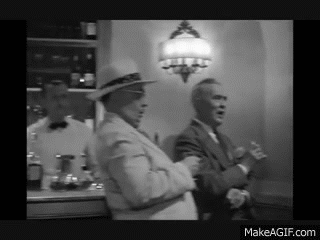

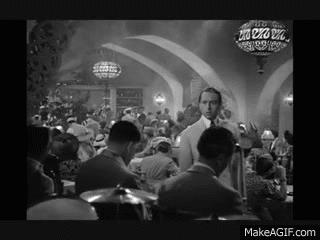

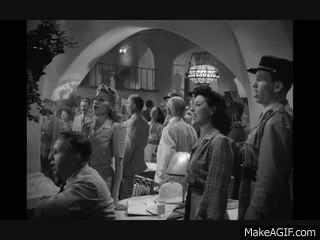
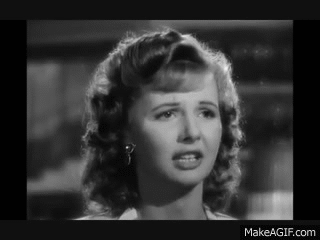
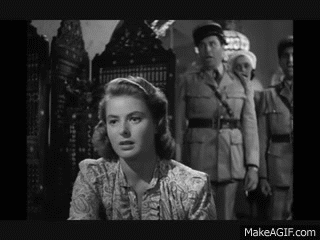
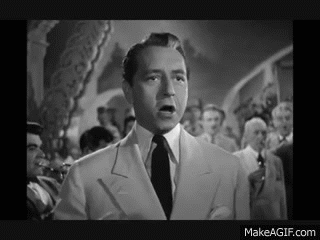
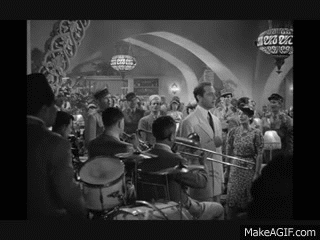
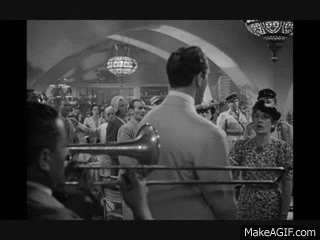
No comments:
Post a Comment